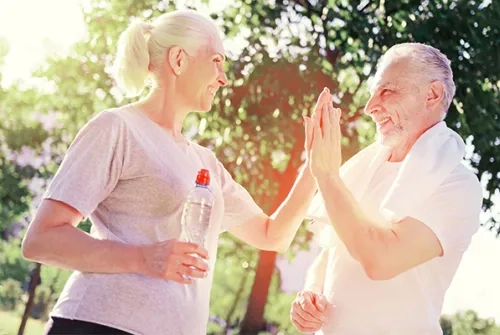Alo Yeditepe
Alo Yeditepe
Dehydration can Lead to Forgetfulness in the Elderly
According to the Internal Medicine Specialist and Professor at Yeditepe University Kozyatagi Hospital, elderly individuals should consume about 2-2.5 liters of water per day. Dr. Yaşar Küçükardalı warned that lack of fluid may lead to forgetfulness in the following years.
Water is one of the basic elements of life. Especially on hot summer days, water consumption is even more important. Reminding that the elderly most affected by the heat should consume an average of 2-2.5 liters of water per day, Yeditepe University Kozyatağı Hospital Internal Medicine Specialist Prof. Dr. Yaşar Küçükardali explained the relationship between water consumption and the health of brain functions. Recalling an article published in the British Journal of Medicine, Prof. Dr. Yaşar Küçükardali: “The British Journal of Medicine, one of the oldest medical journals in the world, has reviewed all the literature on forgetfulness in older individuals to date. In this article, which contains a summary of 400 Alzheimer's research and lists the factors affecting forgetfulness, 'Postural Hypotension' is also included.”
"Fluid Deprivation can Lead to Low Blood Pressure”
Stating that he does not tolerate low blood pressure in elderly individuals, thirst is closely related to 'Postural Hypotension', Prof. Dr. Yaşar Küçükardali continued as follows: “Depending on the position, our system maintains the blood pressure. So, when a person is lying down or standing up, their blood pressure remains at a certain level. However, if a person has fluid deprivation, they may experience low blood pressure when transitioning from a lying position to a standing position. This leads to a temporary decrease in blood supply to the brain. This condition, which is defined as' Postural Hypotension ', is very serious. The more frequent these attacks are, the higher the risk for Alzheimer's. "Is there Postural Hypotension in Elderly Individuals?" To understand this, the person's blood pressure and pulse are measured first while lying down, then standing. If the systolic blood pressure drops by more than 2 units while standing, and the pulse rate increases by more than 20, the person may have fluid depletion.
Which Diseases are Indicated by Dehydration?
Explaining that water deficiency can lead to a false sodium excess, Prof. Dr. Küçükardali said: “This situation negatively affects brain functions. Depending on the degree of fluid deficiency, it leads to serious consequences that can range from a mild drowsiness to a coma. Dehydration in the elderly can cause an imbalance in electrolytes, including sodium. This negatively affects consciousness. Because it can lead to low blood pressure, dehydration can also cause a buildup of urea due to insufficient blood flow to the kidneys. One of the important causes of urea elevation is fluid deficiency. Urea elevation is one of the important risk factors in terms of negatively affecting consciousness in elderly individuals. Not consuming enough water leads to a higher sugar content in the blood. This again negatively affects consciousness. ”
Beware of Dizziness!
Yeditepe University Hospital Internal Medicine Specialist Prof. Dr. Yaşar Küçükardali warned; reducing fluid intake, especially in hot weather, can adversely affect a person's kidney function. “In addition, low blood pressure leads to slowed brain blood flow, which in the long term leads to weakened brain functions and slowed communication of some neurons. Short-term symptoms of dehydration include dizziness, decreased urine output, fatigue and weakness, feelings of imbalance, blurry vision, headache, sweating, and palpitations. Therefore, we recommend everyone to drink 2-2.5 liters of water per day. But if there is an extra different need, this amount can be increased. We recommend that elderly individuals do not stay outside too long, especially in the middle of the day when fluid loss is highest with sweating. I recommend spending time in cool places, protected from the sun. ”
Press Coverage: haberturk.com | hurriyet.com | cnnturk.com | cumhuriyet.com | star.com | msn.com | milliyet.com | odatv4.com
About
Faculty and Year of Graduation:
Medical Faculty of GATA, 1987
”
See Also
- What is Hypoglycemia?
- Dealing Ways with Overtemps
- 8 Causes of Sweating
- What is HCT (Hematocrit)?
- Misconceptions About Hypertension
- What is Hypertension?
- Latent Diabetes (Prediabetes)
- An Infection that Does Not Recover is a Precursor of Diabetes
- 'Exercise Vaccine' Recommendation for Chronic Fatigue
- The Warrior That Protects Our Immune System: Vitamin D
- The Immune System and Sleep Are Sending Messages to Each Other for A Healthy Life
- Eye, Kidney, and Heart Enemy: Hypertension
- Vitamin D May Be the Cause of Your Fatigue
- Benefits of Antioxidant
- Do I Have Covid or Influenza?
- Health Problems Triggered After Recovery from Covid
- Not Every Sore Throat Is Caused by an Infection!
- Why Is Vitamin D Deficiency So Common in Türkiye?
- Aspirin Used Without Physician's Advice Increases Risk of Bleeding!
- Healthy Aging Course
- Comprehensive Geriatric Assessment
- Why Are the Elderly at Risk for Coronavirus?
- Symptoms of Vitamin D Deficiency
Alo Yeditepe




